Artificial Intelligence (AI) is rapidly transforming the landscape of digital marketing, and one of the areas where it is having a profound impact is Search Engine Optimization (SEO).
AI enables marketers to optimize websites more efficiently, enhancing various aspects of SEO, from keyword research to content creation, user experience, and technical optimization.
Traditionally, SEO has involved manual processes like keyword research, backlink building, and on-page optimization. However, AI is revolutionizing these practices by automating repetitive tasks, providing real-time insights, and predicting search trends.
AI algorithms can quickly analyze vast datasets to identify the most effective SEO strategies, saving businesses time and effort while ensuring better results.
Furthermore, AI helps SEO professionals understand user intent, optimize content for search engines, and improve user experiences, which are all critical factors in modern SEO practices.
In addition, businesses need to consider what are five marketing strategies that retailers spend half of their annual budget on? AI is helping streamline and optimize these marketing tactics, ensuring better return on investment.
In this post, we will explore how to use AI for SEO to gain a significant edge in the market.
What is AI in SEO?
Artificial Intelligence (AI) in SEO refers to the use of machine learning, natural language processing (NLP), and other AI technologies to optimize websites for better performance on search engines.
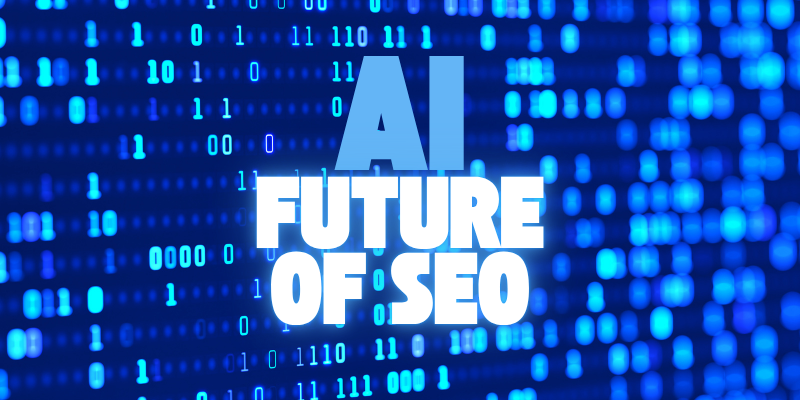
AI tools help SEO professionals make smarter, data-driven decisions by analyzing large datasets, automating repetitive tasks, and predicting trends that are crucial for improving rankings and user experience.
For example, AI can automate tasks like content optimization, analyze advertisement examples, and fine-tune strategies based on consumer behavior, helping businesses how to start a Shopify store and improve their eCommerce SEO.
As businesses continue to explore What is Perplexity AI, incorporating these technologies into digital marketing efforts will drive growth and more successful campaigns.. By leveraging AI in SEO, marketers can refine their approach to achieving better user engagement and content relevance.
AI's ability to mimic human intelligence plays a significant role in SEO optimization, and when combined with DevOps automation tools, it further enhances operational efficiency.
For example, AI algorithms can understand user behavior, search intent, and content relevance.
AI-driven tools can also perform complex tasks like keyword research, competitor analysis, and content generation, which traditionally required manual effort. Highlighting why is AI good for streamlining these SEO tasks.
AI technologies like NLP help machines understand and process human language, making it easier to optimize content for both search engines and user engagement.
How to Use AI for SEO? Enhancing SEO with AI
AI is revolutionizing SEO by streamlining processes and providing deeper insights. Here's how artificial intelligence in SEO can enhance your SEO strategy:
1. Competitor Research
- Use AI in SEO to analyze top-ranking pages, uncovering their content, structure, and performance.
- Generate instant summaries of competitors’ strengths and weaknesses.
- Pinpoint content gaps and opportunities to outperform competitors, giving you an edge with SEO for AI.
2. AI-Powered Keyword Research
- Discover both short- and long-tail keywords relevant to your audience with AI-driven tools.
- Generate keyword suggestions based on specific prompts, focusing on user intent (e.g., “first-time parents” vs. “first-time grandparents”).
- Customize your keyword research for better targeting, increasing organic traffic by using AI for SEO.
3. Content Outlines for SEO
- Use AI for SEO to generate detailed content outlines, including audience insights, content structure, and search intent.
- Review AI-generated outlines to ensure they align with SEO best practices and audience needs.
- Optimize content creation without losing focus on quality.
4. Meta Tags Optimization
- Automate the creation of optimized title tags, meta descriptions, and headings with AI.
- Use AI SEO tools like ChatGPT or Gemini to create customized prompts for tailored meta tags.
- Enhance CTR (Click-Through Rate) and search visibility by using AI for SEO to create compelling meta data.
5. Image Creation and Optimization
- Leverage AI tools like ChatGPT Plus, Gemini, and Canva to create unique, custom images.
- Optimize images for SEO by generating AI-powered alt text with tools like Gemini or Ahrefs.
- Stand out in Google Image search results and improve rankings with AI-enhanced images.
6. Schema Markup Generation
- Use AI to generate structured data (like FAQ and HowTo schema) for your content.
- Automate schema generation to make your content more discoverable in rich snippets and voice search results.
- Implement AI-generated schema with minimal effort, ensuring you stay ahead of SEO trends.
7. Internal Linking and SEO Structure
- Speed up internal linking discovery with AI tools, helping to improve your website’s structure and user experience.
- Use AI for SEO to suggest relevant internal links, improving website crawling and indexing.
8. Data Analysis and Reporting
- Upload data like ranking progress and optimization metrics to AI tools for instant insights.
- Spot trends, correlations, and potential opportunities based on AI-generated analysis to refine your SEO strategy.
9. Creating Project Specs for Teams
- Use AI in SEO to generate clear, concise project specifications for your team, making it easier for non-SEO professionals to understand.
- Keep your team aligned and enhance productivity with AI-generated templates and guidelines.
10. Page Experience Analysis
- Leverage AI tools like Microsoft Clarity to analyze user behavior with heatmaps, click maps, and more.
- Use AI to identify and resolve issues related to page speed, design, and usability, improving rankings and user experience.
4 Key AI Technologies Used in SEO
AI has introduced several cutting-edge technologies that enhance SEO practices. These technologies help optimize websites, predict trends, and improve user experience.
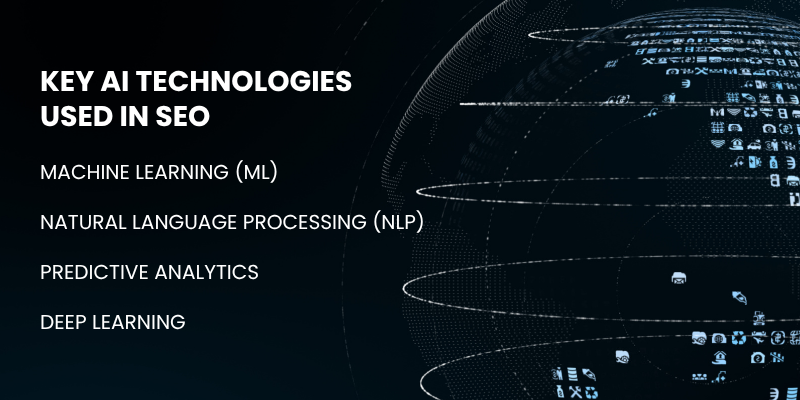
Some of the key AI technologies used in SEO include Machine Learning (ML), Natural Language Processing (NLP), Predictive Analytics, and Deep Learning.
1. Machine Learning (ML)
Machine learning is a subset of AI that allows algorithms to learn from data and improve over time without being explicitly programmed.
In SEO, ML is used to improve predictions about user behavior and search trends. By analyzing large volumes of data, ML algorithms can identify patterns in search behavior, which helps SEO professionals predict how users will search for content.
This can improve keyword targeting, content recommendations, and user engagement. For example, ML can analyze user click-through rates (CTR), time spent on pages, and bounce rates to adjust SEO strategies accordingly.
Additionally, integrating marketing tactics that leverage ML helps businesses refine their SEO strategies and stay competitive.
2. Natural Language Processing (NLP)
NLP is a branch of AI focused on the interaction between computers and human language. It is vital in SEO for content optimization and understanding search queries.
NLP helps machines interpret and process text in a way that mimics human understanding. In SEO, this means that search engines like Google can better understand user intent behind search queries, even those that are conversational or in the form of long-tail keywords.
By applying NLP, SEO professionals can create content that aligns with both the language of users and search engines, improving relevance and search rankings, thereby contributing to the benefits of SEO in attracting organic traffic and improving site visibility.
3. Predictive Analytics
Predictive analytics uses AI to forecast future trends and behaviors based on historical data. In SEO, it helps marketers anticipate which keywords and topics will gain popularity, allowing them to create content ahead of time.
By analyzing patterns in user searches, AI can predict shifts in search behaviors, providing a competitive advantage by optimizing content for future demand.
4. Deep Learning
Deep learning is a more advanced subset of machine learning that processes large datasets and identifies complex patterns.
It plays a significant role in optimizing image and voice searches. Deep learning algorithms can analyze images, detect objects, and understand context, improving image search optimization.
Similarly, with voice search, deep learning helps interpret natural speech and identify search intent, allowing websites to be optimized for voice-based queries and improving overall search visibility.
Explore Our Digital Marketing Services!
How AI Enhances Keyword Research?
Keyword research is at the core of SEO, and AI is significantly improving how this essential task is performed.
AI-driven tools streamline keyword discovery, enhance the understanding of search intent, and provide valuable insights into competitor strategies. These capabilities help marketers build more effective and data-driven SEO strategies.
1. Automated Keyword Discovery
AI tools have revolutionized the process of keyword discovery by automating the identification of relevant search terms.
Traditional keyword research often involves manually inputting keywords into search engines or using static lists. AI, however, can analyze large datasets and scan millions of websites, blogs, forums, and social media platforms to identify emerging trends and new keywords.
Tools like MarketMuse, Ahrefs, and SEMrush use machine learning algorithms to suggest high-value keywords and long-tail variations that are often overlooked in manual research.
In industries such as oil and gas marketing agency, AI can uncover hidden opportunities by analyzing the relationships between keywords and their context across various sources, making the process more dynamic and comprehensive.
AI can also uncover hidden opportunities by analyzing the relationships between keywords and their context across various sources, making the process more dynamic and comprehensive.
2. Search Intent Understanding
Understanding user intent behind a search query is one of the most crucial aspects of keyword research.
AI, particularly through Natural Language Processing (NLP), has made it possible for search engines and SEO tools to better understand and predict the motivations behind a search query.
Whether a user is seeking information, looking to make a purchase, or searching for a service, AI can interpret nuances in search terms and help identify the intent behind the search.
For instance, AI can distinguish between informational, navigational, and transactional queries, enabling marketers to optimize content for the specific intent behind the search.
This level of understanding ensures that content matches what the user is actually looking for, improving rankings and engagement.
3. Competitor Analysis
AI is also an invaluable tool for competitor keyword analysis. By using AI-driven tools, SEO professionals can gain deep insights into the keywords their competitors are targeting, uncovering both opportunities and gaps in their own strategy.
AI can also analyze what is CTA (Call to Action) in competitor strategies, providing deeper insights into how marketers drive engagement and conversions through optimized CTAs.
AI algorithms can analyze competitor websites, extract keyword data, and evaluate which terms are driving the most traffic.
This analysis provides actionable insights that help marketers refine their own keyword strategies, find high-ranking but low-competition keywords, and develop content that competes more effectively in the search engine results pages (SERPs).
Improving User Experience with AI
User experience (UX) is a critical factor in SEO services, and AI technologies are enhancing how websites engage users and optimize their overall experience.
From AI-driven chatbots to voice search optimization and behavioral analysis, these technologies are making websites more interactive, personalized, and efficient.
1. Chatbots and Virtual Assistants
AI-powered chatbots and virtual assistants play a pivotal role in improving user engagement and enhancing website interactions.
These intelligent bots can provide instant, 24/7 customer support by answering queries, guiding users through processes, and offering personalized recommendations.
For example, when a user visits a website, an AI chatbot can greet them, answer frequently asked questions, or help them navigate the site.
This immediate interaction reduces bounce rates, increases time spent on site, and ultimately boosts user satisfaction.
Marketers can also enhance chatbot functionality by integrating AI SEO software to optimize their interactions based on common user queries and preferences.
2. Voice Search Optimization
As voice search becomes more prevalent with devices like Alexa, Siri, and Google Assistant, optimizing content for voice-based queries has become essential for improving UX.
AI helps optimize content by analyzing spoken language and making it more conversational. Unlike typed searches, voice queries tend to be longer and more natural, so AI helps identify and integrate long-tail keywords and phrases into content.
AI can also adapt content to be more aligned with the way people speak, ensuring that it resonates with voice search users and provides relevant results.
With this shift, a comparison like "Duckduckgo vs Google" may arise, as users expect quicker and more accurate voice search responses from search engines.
3. Behavioral Analysis
AI’s ability to track and analyze user behavior is another powerful tool for improving UX. This data can be used to adjust site features, improve navigation, and personalize content.
For instance, if AI detects that users are frequently abandoning a checkout page, it can suggest modifications to the process to make it smoother.
By continuously adapting to user behavior, AI ensures that websites remain relevant, user-friendly, and optimized for maximum engagement and conversions.
Additionally, many marketers may ask "what is an SEO company?" when considering the firms that specialize in leveraging AI for better UX and SEO performance.
Predictive SEO with AI
Predictive SEO is a powerful approach that leverages AI to forecast future trends, helping SEO professionals stay ahead of the competition.
By analyzing historical data, AI can predict upcoming search trends, keyword performance, and ranking opportunities.
This allows marketers to adapt their strategies proactively rather than reactively, improving the overall effectiveness of their SEO efforts.
For businesses offering ecommerce development services, using predictive SEO can help optimize product listings and content to align with emerging trends and consumer interests.
1. Trend Analysis
AI excels at analyzing vast datasets to identify emerging trends and popular keywords. By studying patterns in user behavior, search engine algorithms, and content performance, AI can detect shifts in user interests and search habits.
This enables SEO professionals to stay ahead of the curve by optimizing content for trending topics before they peak.
For instance, AI tools can predict which long-tail keywords or phrases are gaining traction based on real-time data, helping businesses create content that aligns with future search demand.
Additionally, businesses offering web design and development services can use this predictive power to ensure their websites are optimized for trends, ensuring that the user experience remains relevant and engaging.
Tools like Google Trends and TrendSpotter use AI to provide insights into the direction of search trends, allowing marketers to align their strategies accordingly.
2. Rank Prediction
AI can also predict how well certain keywords will rank in search engine results pages (SERPs).
By analyzing factors such as competition, search volume, content quality, and backlink strength, AI can estimate the likelihood of a page ranking for a specific keyword.
This allows marketers to focus on keywords that offer the highest potential for ranking success. Additionally, AI can recommend strategies for optimizing content based on these predictions, such as adjusting keyword density, improving page structure, or increasing backlinks, ensuring that efforts are directed toward the most effective SEO tactics.
Get Your Free SEO Audit Report Today!
Top 4 AI Tools for SEO
AI-driven SEO tools are transforming the way marketers optimize websites. These tools leverage machine learning, natural language processing (NLP), and predictive analytics to enhance various SEO tasks such as keyword research, content optimization, and performance analysis.
Some of the most popular best SEO reporting tools that are revolutionizing SEO tasks include MarketMuse, Clearscope, and Surfer SEO.
These tools are powered by AI algorithms, providing actionable insights to help marketers optimize their content, improve keyword targeting, and streamline their SEO strategies. For businesses looking to enhance their SEO and understand what is network marketing in terms of affiliate strategies, AI tools provide crucial data and actionable recommendations.
Below are some of the most popular AI-powered SEO tools that are helping marketers streamline their strategies and improve rankings.
1. MarketMuse
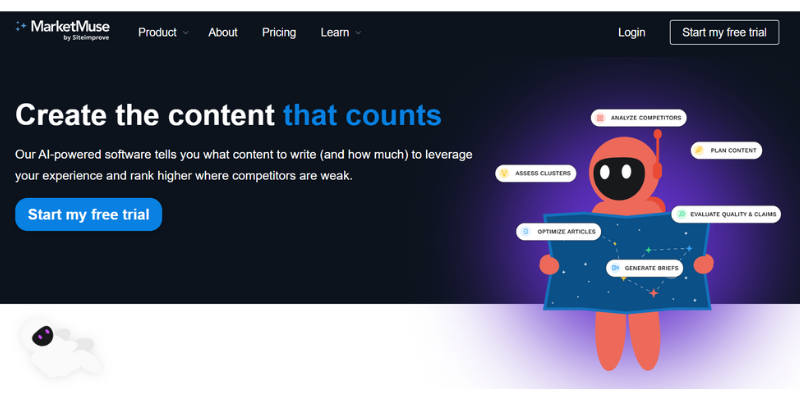
MarketMuse is an AI-powered content research and optimization platform that helps marketers create high-quality, SEO-optimized content.
It uses AI to analyze top-ranking pages, suggesting relevant keywords, topics, and content structure. MarketMuse’s AI capabilities also help identify content gaps and provide recommendations to enhance content depth and relevance, improving a website’s ability to rank higher in SERPs.
2. Surfer SEO
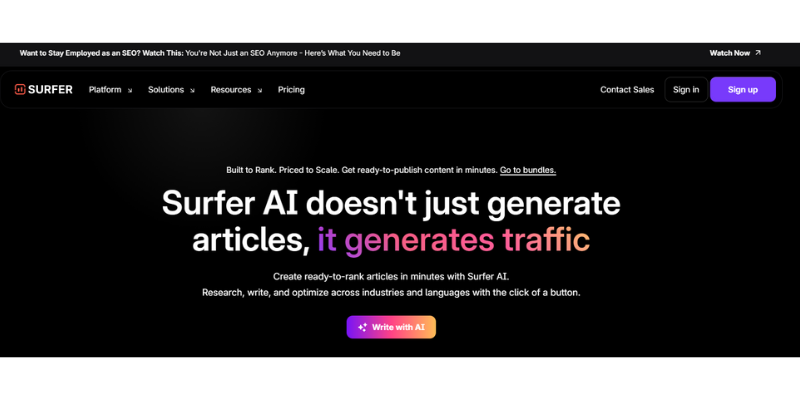
Surfer SEO is an AI-driven on-page optimization tool that analyzes the top-ranking pages for a specific keyword and provides a comprehensive SEO audit.
It uses AI to suggest improvements for title tags, meta descriptions, headings, keyword density, and internal linking.
Surfer SEO’s algorithm helps align content with the latest ranking factors, making it easier to optimize pages and improve search visibility.
3. Clearscope
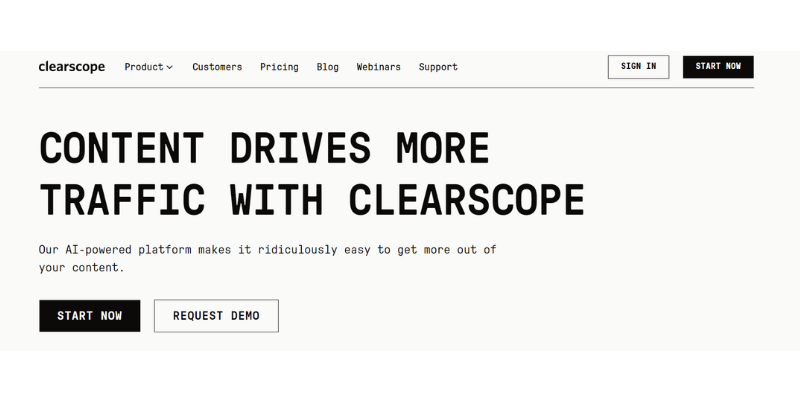
Clearscope is an AI-powered content optimization tool that focuses on improving content relevance and keyword usage.
By analyzing top-performing pages and suggesting additional related terms, Clearscope helps SEO professionals create content that covers all aspects of a topic.
Its AI capabilities ensure content is comprehensive, engaging, and more likely to rank higher for target keywords.
4. Frase
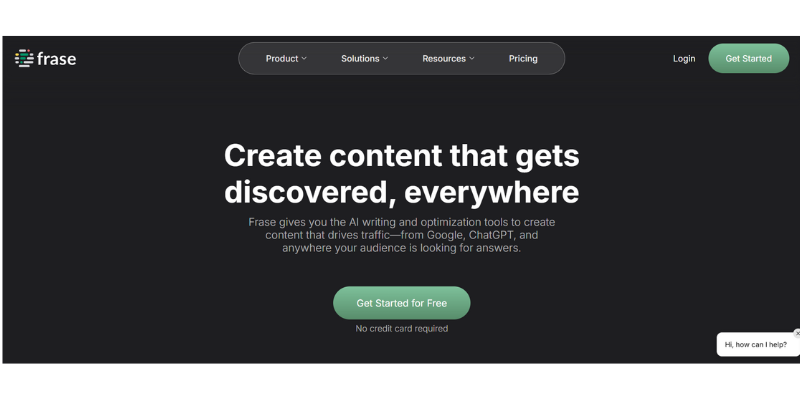
Frase is an AI-powered content creation and research tool that helps marketers generate SEO-optimized content based on user queries and search intent.
It uses AI to suggest relevant topics, generate content outlines, and automate the content creation process. Frase also provides keyword research insights and helps optimize content for better ranking.
Additionally, with the growing popularity of eCommerce platforms, many retailers are questioning is Shopify legit? By using AI-powered SEO tools, Shopify stores and other eCommerce platforms can better optimize their websites and marketing efforts.
Summary of 4 AI Tools for SEO
Below is a table summarizing the top 4 AI tools for SEO, based on their features and capabilities:
| Tool | Description | AI Capabilities | Rating |
|---|---|---|---|
| MarketMuse | AI-powered content research and optimization platform that helps create high-quality, SEO-optimized content. | Analyzes top-ranking pages, suggests relevant keywords, topics, and content structure. Identifies content gaps. | ⭐⭐⭐⭐⭐ (5/5) |
| Surfer SEO | AI-driven on-page optimization tool that provides a comprehensive SEO audit for keyword-specific pages. | Suggests improvements for title tags, meta descriptions, headings, keyword density, and internal linking. | ⭐⭐⭐⭐ (4/5) |
| Clearscope | AI-powered content optimization tool that improves content relevance and keyword usage by analyzing top-performing pages. | Suggests related terms, helping create content that is comprehensive, engaging, and more likely to rank higher. | ⭐⭐⭐⭐½ (4.5/5) |
| Frase | AI-powered content creation and research tool that generates SEO-optimized content based on user queries and search intent. | Suggests relevant topics, generates content outlines, automates content creation, and provides keyword research insights. | ⭐⭐⭐⭐½ (4.5/5) |
The Future of AI in SEO
The future of SEO is increasingly intertwined with AI, and its impact will only grow as technology continues to evolve.
AI is set to revolutionize SEO by driving greater automation, improving content generation, and enhancing personalization, making SEO strategies more efficient and accurate.
1. Increased Automation and AI’s Role in Content Generation and Personalization
AI is poised to automate many SEO tasks that are currently time-consuming and manual, such as keyword research, content optimization, and backlink analysis.
AI-powered tools will continue to refine content generation, enabling businesses to create high-quality, SEO-optimized content at scale.
With AI-driven content generation tools like GPT-3, marketers will be able to produce articles, blogs, and product descriptions quickly while maintaining relevance and quality.
As businesses begin to leverage AI for content generation, they may also answer questions like "is affiliate marketing legit" through AI-driven analysis, providing more relevant content and addressing user concerns.
AI will also enhance personalization by analyzing user data to create tailored content experiences. Personalized content based on user preferences and search intent will become the norm, improving engagement and increasing rankings.
2. Improving SEO Strategy Accuracy and Enhancing Decision-Making
AI will significantly improve the accuracy of SEO strategies by providing data-driven insights that help marketers make better decisions.
As B2B vs B2C marketing tactics evolve, AI will help differentiate strategies, creating tailored content experiences and improving conversion rates.
By analyzing vast datasets, AI will predict trends, identify emerging keywords, and recommend the most effective SEO tactics.
This level of precision will allow businesses to refine their strategies in real-time, adjusting based on performance analytics and changing search algorithms.
AI will also help marketers allocate resources more effectively, ensuring that their SEO efforts are focused on high-impact activities.
Ultimately, AI will make SEO strategies more dynamic, responsive, and capable of delivering consistent results.
FAQs: How To Use AI For SEO?
What is AI in SEO?
AI in SEO refers to using artificial intelligence technologies like machine learning and natural language processing to optimize websites for better search engine rankings. AI helps automate tasks like keyword research, content optimization, and data analysis, making SEO more efficient.
How to Use AI for SEO?
You can use AI for SEO by leveraging AI-powered tools to automate tasks such as keyword research, content generation, competitor analysis, and meta tag optimization. AI also helps predict search trends and improve user experience on your site.
Can AI Do SEO?
Yes, AI can assist with SEO tasks like keyword research, content optimization, and automating repetitive SEO processes.
Can ChatGPT Help with SEO?
Yes, ChatGPT can generate SEO-friendly content, suggest keywords, improve meta descriptions, and help with on-page SEO.
Is AI SEO Worth It?
Yes, AI SEO is worth it for its ability to save time, improve efficiency, and provide data-driven insights, though it works best with human expertise.
How can AI help with Keyword Research in SEO?
AI-driven tools can automate keyword discovery by analyzing vast amounts of data across websites, forums, and social media. This allows you to find both high-value keywords and emerging trends, ensuring your SEO strategy is always up to date.
Can AI improve User Experience for SEO?
Yes, AI can enhance user experience by personalizing content, optimizing voice search, and offering AI-powered chatbots for real-time support. This helps reduce bounce rates and increases user engagement, which is crucial for SEO performance.
What Are The Benefits of Using AI in SEO?
Using AI for SEO streamlines time-consuming tasks, provides data-driven insights, enhances content relevance, and predicts search trends. It also improves keyword targeting and helps optimize user experience, ultimately boosting rankings and organic traffic.
What Are the Best AI tools For SEO?
Popular AI tools for SEO include MarketMuse, Surfer SEO, Clearscope, and Frase. These tools help with content optimization, keyword research, and performance analysis, making SEO efforts more efficient and data-driven.
Conclusion
AI has already made a significant impact on SEO, transforming the way businesses approach optimization. From streamlining keyword research and content generation to enhancing user experience and automating technical SEO tasks, AI is making SEO more efficient, scalable, and effective. With its ability to analyze vast amounts of data, predict trends, and personalize content, AI is enabling businesses to stay ahead of the competition and improve their search engine rankings with precision. As AI continues to evolve, integrating AI tools and technologies into SEO strategies will be crucial for businesses looking to stay competitive. Centric, a digital transformation agency, emphasizes the importance of embracing AI in SEO to remain at the forefront of innovation.
Understanding how to use AI for SEO will help businesses automate repetitive tasks, optimize content for search engines, and make data-driven decisions that drive better results. The future of SEO will be increasingly driven by AI, and those who embrace it will have a significant advantage in the digital landscape. Stay updated on AI advancements in SEO by following industry news, experimenting with new AI-driven tools, and continually refining your strategies. Embracing AI will not only enhance your SEO efforts but also prepare your business for the future of digital marketing.









